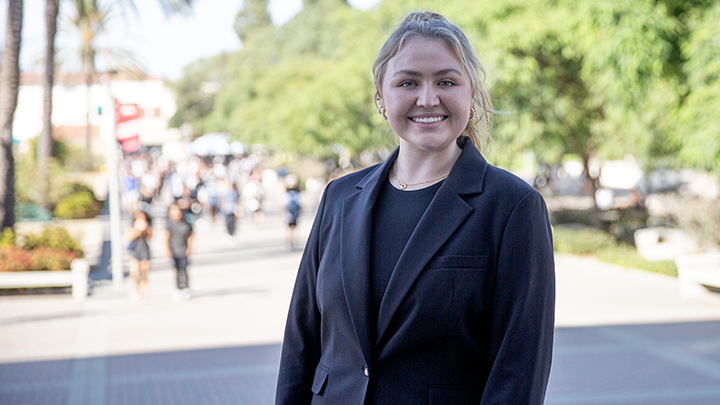S, se puede. Yes, you can.
Jose Luis Alvarado, an SDSU Imperial Valley alumnus and now the provost at CSU Los Angeles, overcame incredible odds on his road to success, thanks to mentors at the college.
Jose Luis Alvarado’s mother asked only one thing of him as a teenager. “¡Por favor! Termina la escuela secundaria, mijo.” Please finish high school, son.
Both of Alvarado’s older brothers had become fathers and dropped out of school by the time they were 16. The oldest had joined a gang.
“That was my mom’s worry for me too,” said Alvarado, an alumnus of San Diego State University Imperial Valley who became the provost and vice president of academic affairs at CSU Los Angeles in July. “By then, I had seen my oldest brother shot, and some of his gang members overdose behind our shack.”
Their family of six lived in a one-room cottage provided to farm workers in Brawley, California, where Alvarado’s parents worked long hours in low wage jobs, his father in the fields and construction and his mother in a citrus packing shed and seasonal work in the grape vineyards of Coachella Valley. They had experienced drive-by shootings, witnessed a car being torched in front of their home and dealt with a child hooked on drugs.
The family had immigrated to the Imperial Valley town from Mexico in 1974, when Alvarado was 10. His parents had just a few years of schooling between them. Alvarado didn’t know a word of English and had only one hour a day of English as a Second Language class in the school he attended with middle-class white children.
“So, for one hour a day I was actively engaged, and the rest of the day I sat in the back of the English-only class with my other Spanish-speaking friend, Julio. We both had no clue what was going on,” Alvarado said.
In high school, his counselor told him he wasn’t “college material,” and suggested he think of trade school. Most of his childhood friends had already dropped out of high school.
Undeterred by low expectations and his family’s situation, and determined to prove his counselor wrong, Alvarado completed high school and went to Imperial Valley College for an associate’s degree and then attended SDSU Imperial Valley where he obtained a bachelor’s degree in psychology in 1987.
“My family was in survival mode, but they were very proud of me for being the first in the family to graduate,” Alvarado said.
He had begun volunteering at a facility for children with emotional and behavioral disorders for his senior project, which led to his first job there. Inspired by the work, Alvarado earned a string of teaching credentials and then decided to get his master’s in special education at SDSU Imperial Valley, and was selected as the outstanding graduate student of the special education department in 1994. When a special education program for rural communities began at Imperial County, he was hired to teach.
Alvarado later applied for the CSU Doctoral Incentive Program and pursued a Ph.D. in special education from the University of Virginia, which offered him a full scholarship. In 1999, he returned to SDSU’s main campus to teach, and rose to the rank of associate dean at the College of Education in 2009. His research focused on creating greater access and tools for success for traditionally underrepresented students and eliminating achievement gaps.
In 2014, Alvarado became the founding dean of the College of Education at CSU Monterey Bay, where he established a “grow-our-own” program to train a corps of local school teachers to serve the predominantly Latino, low-income farm communities in Salinas Valley. “In so many ways, my work centers on the principle of paying it forward,” Alvarado noted.
Six years later, he is now the top academic officer at CSU LA.
He was scheduled to return to SDSU Imperial Valley on May 14 this year as commencement speaker, 33 years after he graduated, but the COVID-19 pandemic led to commencement being postponed.
A lot has changed on campus since his student days. Now there are modern adobe buildings, a grassy quad area and a vibrant campus life with art exhibits and live music events. Back then, classes were held in portable classrooms.
“But it didn’t matter because we had a small group of very committed faculty that made a big impression on all of us,” Alvarado said. “The Student Center was an old wooden house that was right on the grounds of the campus. We ate from a taco truck that came every night. All of these experiences allowed us to establish a very strong bond with each other.”
Alvarado credits SDSU mentors for changing the trajectory of his life — Reynaldo Ayala, Roger Dunn, Suzy Fitch, and Patricia Cegelka to name a few — and hopes his life lessons will inspire SDSU Imperial Valley’s current students.
“As a first-generation low-income immigrant who didn’t speak English, I’m here to tell you if you put in the hard work and you persevere, there are so many people who will help you,” he said. “If I did it, you can do it too!”



